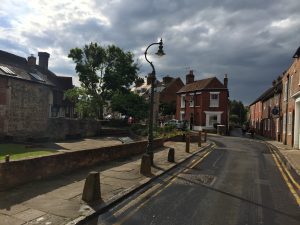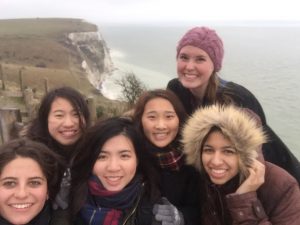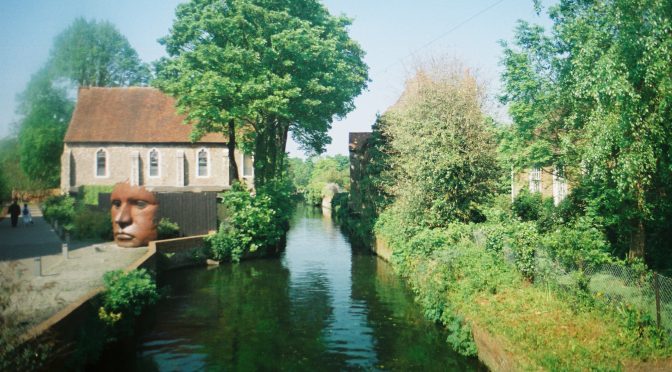Pre-departure:
After being accepted for an exchange by the PGIO in Stellenbosch, I then had to do an online application for my host university. This was very straight forward and after waiting a couple of weeks, the University of Kent notified me that I had been accepted for short term studies at their institution. After accepting my offer, I then had to apply for accommodation separately; this can be done through the university’s student accommodation website. At the University of Kent only first years and international students stay on campus, because of a lack of space. I would recommend applying to stay at Parkwood, which is self-catered accommodation, as you will probably share a house with a mixture of international and British students which creates a great atmosphere. You also have the opportunity to pre-order a bedding pack, which includes a duvet, pillow, pillow case, duvet cover and sheet. I would recommend ordering the bedding pack, as you may not have time to buy bedding shortly after arriving as your first day is quite busy and the city centre of Canterbury is quite far from campus.

Once accepted for a place in accommodation the international co-ordinator will send you a link to an online registration form. It is important to do this and send the relative documents to the host co-ordinator before your departure, as it makes registration upon arrival much easier. The university also provides a shuttle service from Heathrow airport to the university, at an extra cost. I would highly recommend making use of this service, as trying to organise transport from the airport to Canterbury just after arriving is an unnecessary stress. The host co-ordinator will also send you the orientation itinerary which may include outings or events which you have to book or pay for before your arrival. I would recommend putting your name down for every event, as you don’t want to potentially miss out.

I am fortunate enough to have a British passport, so unfortunately I don’t know what the process is for applying for a visa to study in England, but I have heard that it’s not a very long process.
At the University of Kent:
The University of Kent organizes an orientation week, which takes place the week before classes start. This week is filled with lots of cool events, such as a welcome dinner, a trip to Dover castle, a high tea, and many more; which gives you ample opportunity to meet all the other exchange students and to start making friends. I would advise going to every event as they are well organised and only take place during the first week, so it is a good idea to take advantage of them for social purposes.

One of the most interesting aspects of studying in England is the surprising number of contact hours you have in the university. Whilst at Kent, I did a French literature module, an English literature module and a philosophy module. For each of these modules I only had a two hour seminar a week, as well as a two hour lecture for English which took place every two weeks. These seminars are much like tutorials at Stellenbosch University, as you are expected to prepare something for the seminar which is then discussed. Your class participation counts towards your final mark, so preparation for each seminar is very important. I found that the expected level of engagement with the material is much akin to the humanities faculty at Stellenbosch. Another interesting aspect of Kent is the work load; I found that I had fewer assignments compared to Stellenbosch. For two of my modules I had two essays and for my other module an essay and an essay based exam. Again, this system is quite similar to Stellenbosch, just without tests. The academic style of writing at Kent is a bit different to the style at Stellenbosch. However there are many guidelines for essay writing for each faculty on the Kent website, and the lecturers are exceptionally helpful in guiding you and are available to make an appointment and discuss your essay before handing it in. This way you will not be too unsure of what is expected of you, and I can honestly say that Stellenbosch prepares you very well to cope in a different academic settings.

At the University of Kent, there are many societies you can join, just like at Stellenbosch. This is a great way to meet local students, and even learn a new skill. While I was there I tried out Lacrosse, which was a bit too aggressive for my liking, but I met some lovely British students. There is also Kent RaG, which is the university’s fund raising society. One of their biggest annual events is called Jailbreak, which is something I partook in with my friends. Jailbreak is when groups of students try to get as far away from campus, with no money in 36 hours to raise money and awareness for a charity of your choice. Although this sounds impossible, it isn’t, especially since Canterbury is very close to the English channel, which makes Europe very accessible. My team unfortunately did not get very far, but the winning group managed to get to Stockholm, Sweden. I would highly recommend doing Jailbreak, as it was truly a once in a life time experience, and you get to raise money for charity too.
Return to Stellenbosch:
At the University of Kent, examinations end at the beginning of July. It may take quite a while for you marks to be released, as they have to moderated by an external examinations board. However, as soon as your transcript is ready the University will send it to Stellenbosch, so you don’t have to worry about getting it yourself.
One of the hardest parts of this entire experience was saying goodbye to all the amazing friends I made during the semester. Although it is easy to stay in touch with technology, it is still hard to leave the place that was your home for at least five months as well as leave the little family you create while abroad. Studying abroad also made me appreciate South Africa more, especially the people (and the sun) , as well as see South Africa from a different perspective. I did find that people were very fascinated by South Africa and interested to learn about it and its history.
I definitely was bitten by the travel bug while studying and traveling abroad, which has pushed me towards pursuing a career which includes traveling. Traveling gives one such a sense of independence and freedom, as well as the overwhelming sense of just how much there is to see and learn. I did find it difficult slotting back into life in South Africa at home and in Stellenbosch, as I had experienced so much and changed and grown but after a while I have settled ,with my memories to keep the experience alive.
